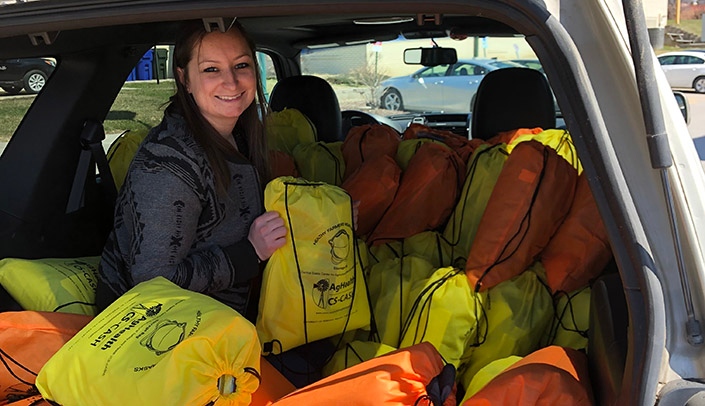Floodwaters ravaged Nebraska and surrounding states in recent months. And, as flooding receded, the true extent of devastation was revealed. Cleanup would be long, hard — and potentially dangerous.
But some of that cleanup was done with the aid of nearly 1,700 “safe flood clean-up kits” inspired by and assembled at UNMC.
The kits — which include not only cleaning supplies, but also personal protective equipment — were designed by experts from the College of Public Health.
Kits were distributed by local health departments and other outreach partners of the college, its Central States Center for Agricultural Safety and Health (CS-CASH), and Nebraska Extension.
The kits were in response to the question: how could UNMC best serve the state? Elayne Saejung, director of emergency management, said leadership went to Ellen Duysen, and CS-CASH, and found that there had been a spike in illnesses at urgent cares in agricultural communities in the wake of flood cleanup.
In Valley, Neb., the Douglas County Health Department handed out nearly 300 kits, while providing subject matter expertise in after-flood safety. “These may seem like small steps,” said Phil Rooney, a resource specialist with DCHD, “but they helped people get back on track in their lives.”
Allison Dye, emergency response coordinator at the Three Rivers Public Health Department, said kits were distributed to emergency managers in three counties, and also given out by her team while doing post-flood disease surveillance. These supplies were “critical to addressing mold cleanup and reducing negative health effects,” she said.
Supplies for the kits were donated by MAP International, which delivered a truck loaded with 15 pallets of donated materials to UNMC’s main Omaha campus April 1. MAP International is a faith-based nonprofit that provides life-changing medicines and health supplies to mission clinics and hospitals in 104 countries around the world. CEO Steve Stirling is a former Omaha resident.
The pallets arrived at the Flood Relief Donation Management Center for UNMC, Nebraska Medicine and the University of Nebraska at Omaha. The donated items, which included respirators, gloves, overalls, scrub sponges, outdoor protective eye wear, tote bags, health kits, twin-blade razors, adult diapers, and exam gloves, were donated from multiple corporations.
The donation was “targeted,” based upon informed recommendations by public health, Saejung said.
A volunteer force, led by Robert Jennings, director of procurement and materials management, assembled the kits.
From there, they went out across the state, and beyond. At the College of Nursing West Nebraska Division in Scottsbluff, master’s of nursing student Heather Kipf had a friend who knew the Pine Ridge Indian Reservation was affected, and she went to leadership with her concern. The result was the mobilization of nursing students, and a delivery to the Lakota Lutheran Center, with kits and other first-aid supplies on their way to the reservation on a medical bus.
